Back in 1985 I first read Robin Lane Fox’s famous gardening book , Better Gardening , where he advised planting a quince tree and he specifically recommended a variety from Yugoslavia called vranja but it wasen’t until twenty five years later here at Old Spa Road that I actually bought and planted one … gorgeous it was when in May it unfurled it’s young leaves , a real knock out of a small tree however by July the leaves had gone all mottled and sick looking and so it continued for the next ten years that I gave up and cut it down .
The quince was sacred to Aphrodite in Greek mythology and was often referred to as “ golden apples ” in Pliny and other writers although far from being like an apple it is almost uneatable raw and is mainly used in marmalades.

I researched the problem and most sources said it was some sort of canker virus however I met Robin Lane Fox at the Carlow Garden Festival and as he was signing my copy of his book I mentioned my experience with his recommended vranja … he commiserated and suggested maybe it was just a bad specimen of tree I had and encouraged me to have another go at growing a quince so I planted another in the Lower Field where the deer promptly had a bite out of the lower branches but obviously didn’t like the taste and the tree recovered and grew really well with no canker or virus and then lo and behold this year it produced it’s first crop .
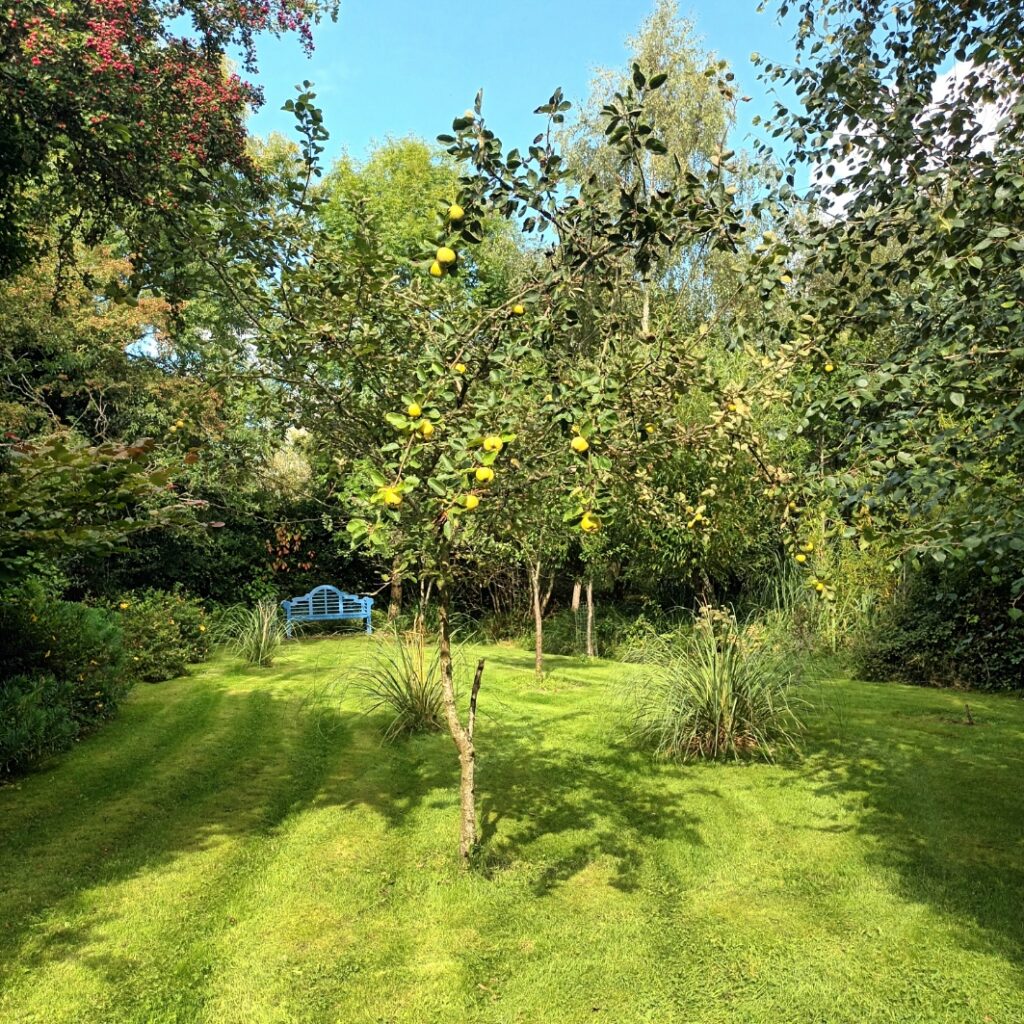
An Elder of my home town
Back in April this year I was asked if I would allow my name to go forward for nomination for selection in a book project to be titled called Elders of Clonmel where thirteen older people who were born and reared in Clonmel would be selected to be profiled for their experiences of growing up in my home town .
I was flattered to be considered but pointed out that though loving Clonmel as I do I had spent most of my life and career away from the town and might even be considered a “ blow in ” compared to more deserving candidates however the organising committee decided to include my story and I was assigned a writer and a mentor to edit a series of interviews I gave in June and the finished book was published in late September .
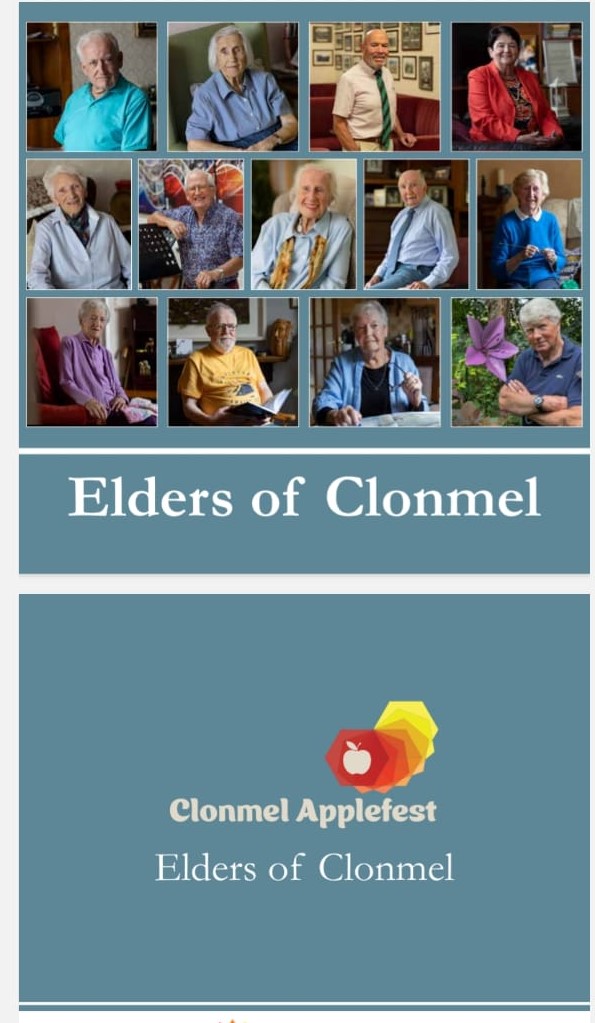
Brian Clancy , a teacher and published playright was assigned to write my section and him being from Clooneen and me from Newcastle , two local villages , we had something in common straight away … added to the fact that we were both interested in history and the fact that our two fathers knew each other albeit they were from different sides of the Civil War .
The interviews took over six hours of taped conversations and from that Brian selected what he wanted to write about … amazing the way a trained writer will extract the material from all we discussed and looking back on the sessions I can see that he skilfully led and amplified the conversations he wanted for his as yet to be written profile .
The Elder’s Project committee were conscious that the nominated people might not be happy with sections of the end project , not that their words were not true but that they might not want to give offence so we were all given sight of our own proposed article and right of approval before publication … only fair as recollections can vary , your truth / my truth and old people forget !
The finished project has been a great success , the book has sold out within it’s first week and a second edition is in preparation .

Two of the participants have passed their 100th birthday and one is approaching it and all the stories are different depending on their recollections and the directions their writers choose to take but one thing is common to all thirteen and that is their love for their home town of Clonmel .
I enjoyed the process immensely and felt honoured to be included .
These days of course with the Woke brigade one has to be careful what goes into the public domain , a lesson I learned back in 1995 in Macedonia when the national newspaper in Skopje asked me to write an article about my impressions of Macedonia after a year living there and the article was published on the front page and titled “ Macedonia , an Irishman’s impression .”
Macedonia An Irishmans impression.
Before I came to work in Macedonia with the EU Mission I had been an avid reader of Greek history, especially Alexander the Great, so the news that I was to get an opportunity to live and work in modern Macedonia was for me the chance of a lifetime. I have now been in your country for over a year , I have a different view of the Macedonian way of life than when I first arrived. You may ask what changed my perspective, it was the kindness and generosity shown to me by Macedonian friends and countless others who have welcomed me into their hearts and homes, fed me delicious meals, and walked with me over nearly all of this countrys beautiful mountains.
My first impression was of the heat ( and this was in May!) which I found so different from my home in Ireland where a temp. of 20 deg. is considered a hot summers day!!.
I found the almost total lack of old buildings due to the earthquake of 1963 bewildering, and I must admit that their modern replacements have not always aged well. The lack of the variety found in western shops which I have always taken for granted before was also hard to get used to.
During my first three months here I was stationed at the border crossings, I always found it difficult to accept the almost casual rudeness and occasional violence handed out Often I would be talking to a border official while a Muslim family waited patiently in the hot sun to be beckoned forward . Usually they would be shouted at, I was always embarrased to be considered part of the beauracracy at the border, my natural inclination was to help but my job here is not to be judgemental, I have to be a silent witness.
I found it difficult to remain silent in such situations but had no choice and my silence made me feel as an accomplice. I have lived here long enough now to realize that the Albanian question is a complex one, but the majority of EU observers only stay three months, so the impression they will take home can be a misleading one.
Now a year later I realize that my first impression of this problem was facile and arrogant. I had made a judgment on something which has been going on for over 500 years, a period in which the Macedonian people were ruthlessly oppressed. As an Irishman I have always resented American writers who on the basis of a short time in Ireland can feel that they have solved the IRISH PROBLEM. Yet here was I now making the same assumptions in Macedonia, this is a complicated issue ,with rights and wrongs on both sides. The Albanian demand of a separate university is one I as an Irishman can especially sympathize with, as in our history we were denied all access to education and even forbidden to follow our own religious beliefs. However I can also see the problem for Macedonia when a sizable part of the population wants to be part of another country. I have traveled extensively in western Macedonia and stayed in the homes of friends who have a very real fear of the bad times of the last war returning. These fears are real, I will be returning home but the problems for Macedonia will remain.
I have given you my honest impressions and I hope you take from my article ( apart from the odd criticism) that I love Macedonia and its people, it is special to me. I have put off my return to Ireland many times and I know that when I do eventually leave at the end of 1995 that I will be returning many times as a tourist.
Macedonia has captured my heart forever.

In hindsight I now realise that what the newspaper editor wanted was a puff piece of what a great place Macedonia was and how lucky I must feel to get the opportunity to live there whereas I took it as an invitation to give an honest impression of my experience … which is what I did ?
I had been appalled at how the Macedonian customs and police officers treated the muslim population crossing the border and the harassment that they handed out on a daily basis be it keeping them waiting or just their rudeness but that is the Balkan mentality at almost all of the border crossing points be it in Croatia, Serbia , Montenegro, Bosnia and it is a power thing that they use to extract bribes .
It is fair to say that my article created a merde storm , really upset people in Skopje with most of the readers ignoring the positive comments and zoning in on my description “ the almost casual rudeness and occasional violence handed out . Often I would be talking to a border official while a Muslim family waited patiently in the hot sun to be beckoned forward . Usually they would be shouted at ” and the immediate reaction was that the Director of the Macedonia Customs Service requested the EU Mission that I be withdrawn from Macedonia as I was now to be considered persona non grata .
The EU was quite calm about it and told me to sort it out locally either by an apology or whatever it took but make it go away !
I contacted the Macedonian Customs HQ and advised that the article was a personal view not any official EU stance and offered to hire a venue and debate in public the article’s veracity about the events I witnessed at the border … but to be advised that I kept daily written records of my visits to the border stations and had recorded the name , rank and serial numbers of all officers involved in every incident and which I would use fully in any queries they might have … and the matter was dropped .
However the matter was not dropped among my local friends in Skopje and the article was produced many times over coffee and debated … not denied mind you just they felt I should see the Albanian / Muslim problem in context that the minority Albanians didn’t subscribe to a united Macedonia and wanted to separate eastern Macedonia for union with a Greater Albania .
Lesson learned , don’t interfere in another country’s problem with politics or religion as it is far too complex for an outsider to understand all the complexities .
We have a wooden walkway in the wild garden area that I don’t use that much as it is a bit away from the rest of the garden and there is a small colony of water hens that I prefer not to disturb and this year I didn’t pay much attention to it’s upkeep in keeping the water clear of the dreaded parrot feather with the result that after five months most of the path was totally covered , so much so that I hardly knew where to walk with the wheel barrow … a days job to cut it back and the worst part of it is that the parrot feather is a self inflicted wound as I introduced it to the garden ten years ago thinking it was a pleasant little water plant whereas in a natural pond it is hugely invasive and almost impossible to eradicate .

Nature itself will take over any area left to it’s own devices and this garden being water retentive with rich soil would just be a collection of brambles , thistles and docks in a matter of months … anyone want a job ?!!

We had Indian visitors to the garden in early September who on seeing an upright water lily in the Water Garden immediately said “ lotus ” and that the sight of it brought them back to their own native Kerala in Southern India … I said I wish it was as it is just a common water lily which through a fluke behaves like a small lotus … I saw the lotus last year in Cambodia and what a leaf , what a plant !


Since Covid hit in early 2020 , large scale garden visits and bus tours have not recovered and this is the first time in three years that we have had normal tours and in late September we hosted a Garden Open Day for the local Clonmel Apple Festival .

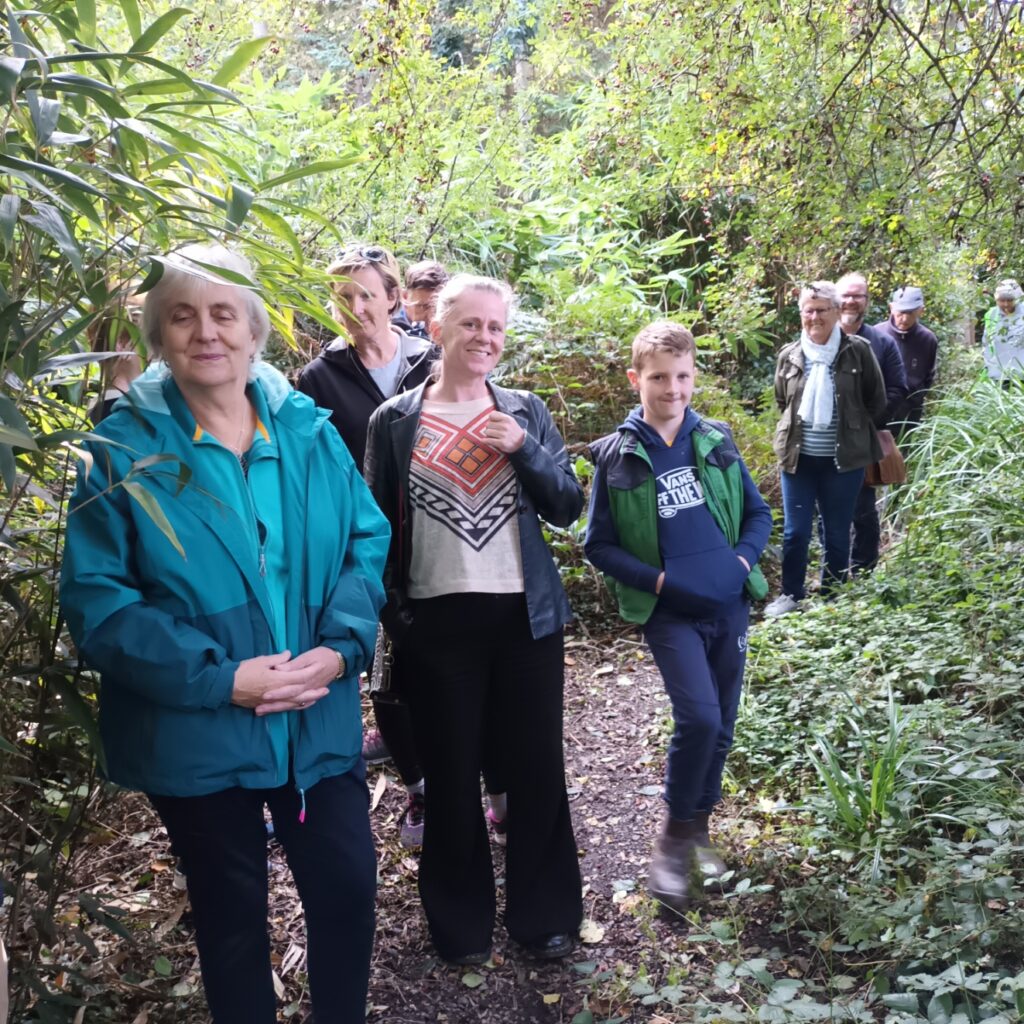
Right plant right place is probably one of the most popular mantras in gardening and one which is trotted out as advice to all aspiring gardeners and I use it myself and try to adhere to it although there are times when you love a plant or shrub so much that you shoe horn it into what you know is not the right place and kid yourself ah sure it will be grand !
I was reminded of that this week when we set about cleaning out the area where we built our “ Covid Wall ” in April 2020 when all the travel restrictions and bans on house visits had just kicked in . I knew the area was infested with ground elder and ivy and was bone dry but Snezana worked away doggedly as she does and cleared the ivy but I planted a lot of hostas , my favourite plant , thinking the shade will suit them but the ground was too dry and they never thrived and have all but died … right plant right place my arse … the only thing that thrived was a dwarf acer , ground cover geraniums and crocosmia and Snezana’s suggestion when she saw me cleaning it was to extend the lawn and grass it all which would look well leading in to the wall and over the winter moths we will revisit it .

For years I have tried to grow echiums , a tall flowering plant from Medeira since I first saw them in Margaret Rea’s garden outside Cahir , a gardening friend who has had great success with them . Margaret has given me two previous boxes of echium seedlings , the deer ate the first lot and the frost got the second two plants last January just when they had reached a nice height but Margaret donated a third box last week and we will go again … you need hope as a gardener !
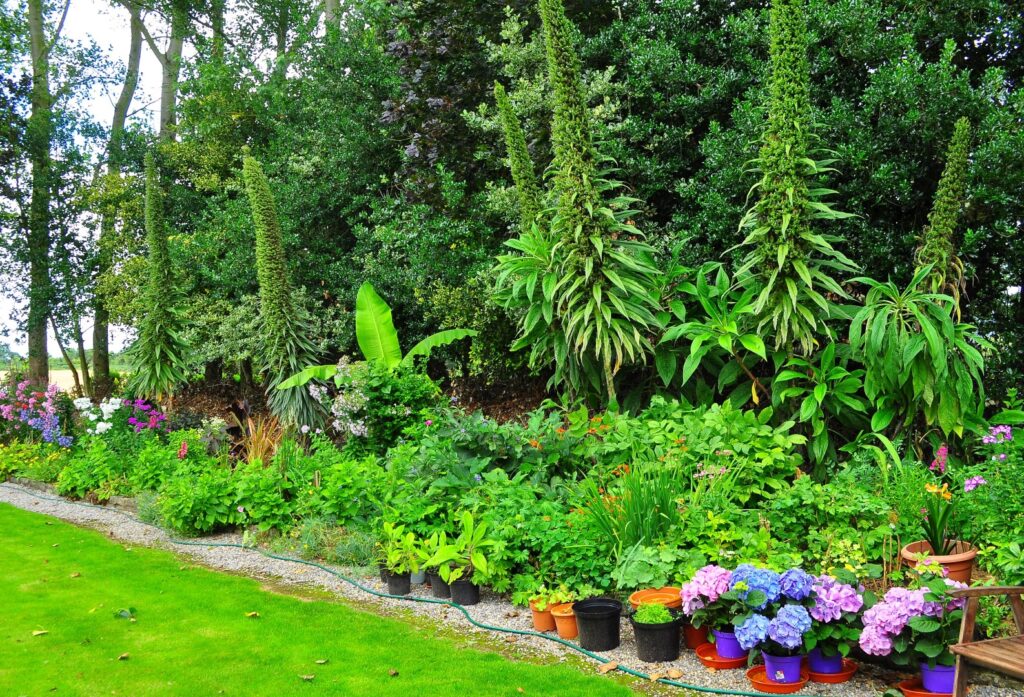

A shrub I love and which is in flower for most of the summer but especially in September is hypericum and it is an easy plant to grow in light or shade and it will tolerate even a little bit of damp conditions . The variety to get is hypericum hidcote , a dwarf compact but if left unpruned it can grow up to five feet wide and high , filled with yellow flowers and trouble free … I just give it the odd trim to shape the bush as it self seeds like mad here I pot it up and transfer it around the garden .

Hypericum is an unsung shrub , not shouty at all and just goes quietly about doing a great job throughout the garden , it would not be a top ten shrub but as a filler or back of the border it is a great choice and I would not be without it in any garden .
I worked for fourteen years in the Balkans where the cuisine is just fabulous and I suppose the food everybody associates with Bosnia especially but which are also popular in all the other six former Yugoslav States would be burek , ajvar and cevapi but like the hypericum there are unsung heroes of Balkan cuisine and one of these would be blitva … a dish made of chopped up chard , potatoes and olive oil and the following description pops up on Google “The entire Adriatic area is peopled by folk who find it hard to imagine life without Swiss chard, so much so, in fact, that some have suggested (not entirely tongue in cheek) that this plant is of such importance for Croats, particularly those living by the sea, that it should form part of the new Croatian coat of arms ” .
I was in Croatia in late September where the local town , Podgora , regards itself as the centre of the blitva world so much so that they even have an annual festival … and like cevapi and burek , blitva is heaven sent !

In the garden September 2023
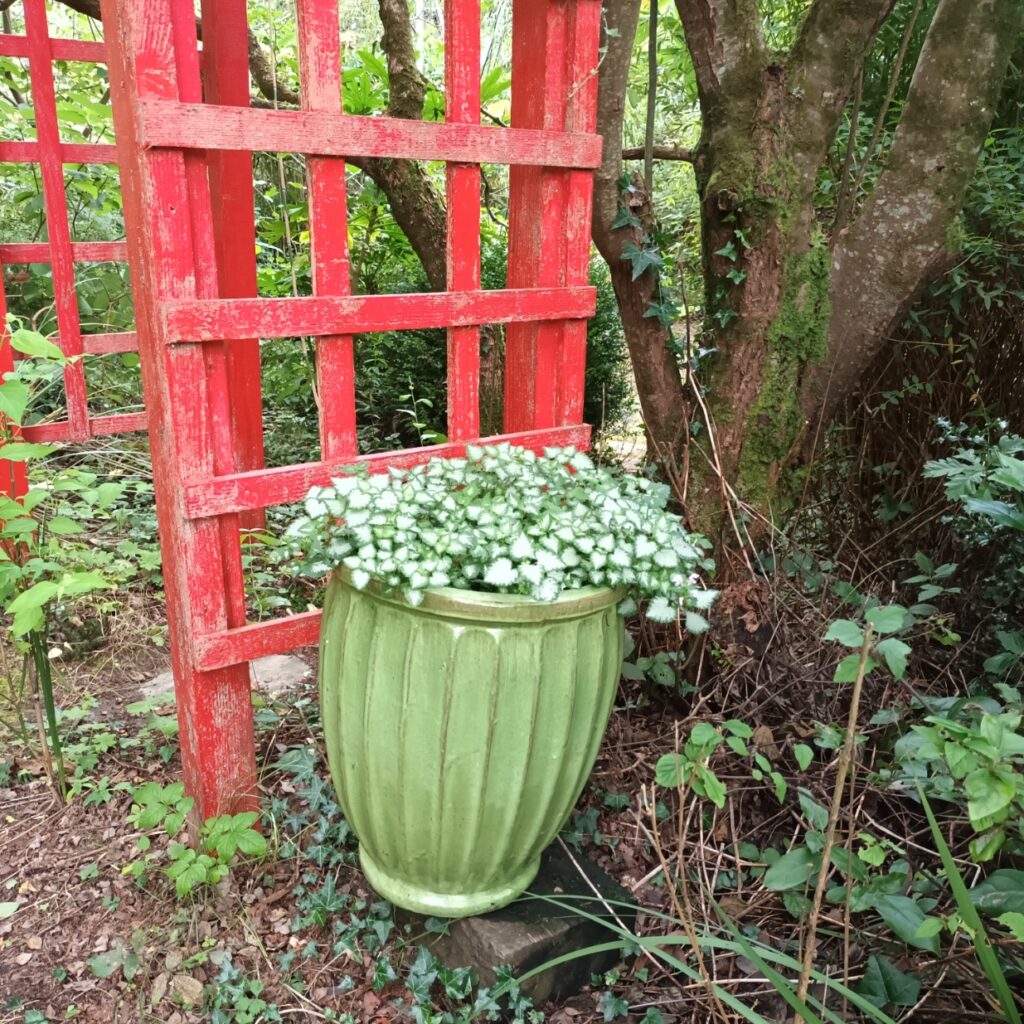


From the garden blog ten years ago in 2013
Latin names of plants
It is worth getting to know the latin names of plants as well as the common names as all over the world from the US to China and Japan a plant is known firstly by its latin name which is the linqua franca ( OK the common world wide language !) of the plant world . It may sound pretentious and a little intimidating and I know it did to me when I was starting out in gardening and while local names are fine the problem is that every country has its own local name so it can be tricky to identify a plant you fall in love with abroad and want to try and source at home . Of course there are the sh.ts of the garden world that like to intimidate and show off but by and large real gardeners are helpful and will go out of their way to assist and even share plants and slips . My assistant here in the garden ( aka Snezana ) resolutely refuses to learn the latin names and maintains that it is a load of pretentious crap and maintains that you can get away with calling a plant uxi / cuxi/ coxi ( finnish alphabet ) by adding the word japonica after it … you have been warned so if you meet her in the garden ……


Leave a Reply